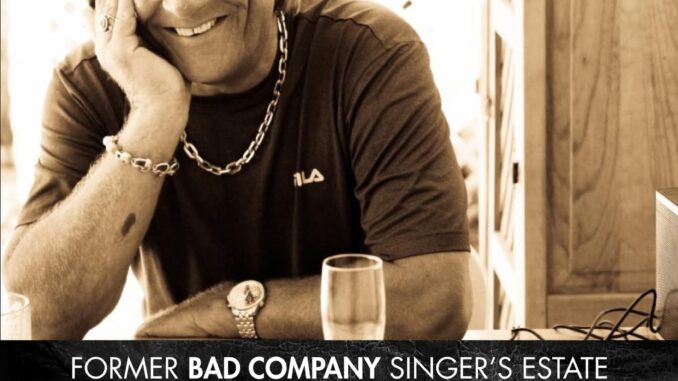
As Bad Company prepares to be inducted into the Rock and Roll Hall of Fame tomorrow, a wave of anticipation and celebration is permeating the music community. The legendary rock band, renowned for their gritty sound and timeless hits like “Feel Like Makin’ Love” and “Bad Company,” is finally receiving one of the industry’s highest honors. However, amid the excitement, a note of disappointment has emerged from the estate of former lead singer Brian Howe, who expressed regret that Howe was not included in the Hall of Fame induction alongside the band’s other members.
Brian Howe, who served as Bad Company’s frontman from 1986 to 1994, remains a significant figure in the band’s history. His tenure marked a period of commercial revival and musical evolution for the group, with Howe’s powerful vocals anchoring four studio albums—*Fame* (1986), *Dangerous Age* (1988), *Holy Water* (1990), and *Here Comes Trouble* (1992). During this time, Howe contributed to some of the band’s most memorable tracks, infusing their classic sound with a renewed energy and grit that resonated with fans new and old.
The estate’s statement, issued earlier today, underscores a complex and emotionally charged situation. “While we are pleased to see Bad Company recognized for their significant impact on rock music, we cannot help but feel a sense of loss and regret that Brian Howe’s contributions are not being officially acknowledged with the band’s induction,” the statement reads. “Brian was an integral part of Bad Company’s history during a pivotal period, and his vocal talent and dedication helped shape the band’s sound during the late ’80s and early ’90s.”
The statement further expressed hope for future recognition. “Perhaps, in time, the same honor being bestowed on Paul Rodgers, Mick Ralphs, Simon Kirke, and Boz Burrell will deservedly be given to Brian,” it continued. “He was an official member of the band, and his artistic contributions deserve acknowledgment alongside those of his bandmates.”
The omission of Howe from the Hall of Fame induction has sparked a lively debate among fans, critics, and industry insiders. Many argue that Howe’s role in the band’s evolution and success during his tenure warrants inclusion alongside the other members. His tenure was marked by a string of commercially successful albums, and his vocal style helped define a vital era in Bad Company’s storied history.
Paul Rodgers, the original lead singer of Bad Company, was also inducted with the band, emphasizing the legacy of the classic lineup. However, Howe’s supporters and estate contend that his contributions have often been overlooked in the narrative of the band’s history, despite his official membership and influence during a key period.
The Rock and Roll Hall of Fame, known for its rigorous selection process and focus on musical influence, has historically faced criticism over the inclusion and exclusion of certain artists and band members. Some argue that the Hall’s criteria should more explicitly recognize the importance of key personnel who have played an integral role in shaping a band’s sound and success, regardless of whether they were part of the earliest formation.
In recent years, the Hall of Fame has made efforts to acknowledge the contributions of members who joined later in a band’s career, but debates continue about the fairness and consistency of these decisions. The case of Brian Howe is seen by many as a reminder of the ongoing challenge in equally honoring all significant contributors to a band’s legacy.
For fans of Bad Company, the induction ceremony is a moment of celebration and reflection. The band’s enduring influence on rock music is undeniable, with their hits continuing to be played on radio stations and streaming platforms worldwide. The recognition by the Hall of Fame affirms their place in music history, even as discussions about Howe’s omission continue to resonate.
Industry experts suggest that the estate’s statement could galvanize efforts to seek posthumous recognition for Howe or push for greater acknowledgment of his role in the band’s history. Some speculate that future honors or special tributes may be organized to honor his memory and contributions more explicitly.
The induction ceremony itself is expected to feature performances by the current lineup of Bad Company, along with special tributes and perhaps moments of reflection on Howe’s impact. Fans and former bandmates alike are likely to pay homage to Howe’s legacy, acknowledging his influence on the band’s sound during a pivotal era.
Ultimately, the debate surrounding Howe’s omission underscores the complexities of legacy and recognition in the rock world. While inductions are a celebration of musical achievement, they also serve as a reminder of the importance of acknowledging every artist’s contribution to the fabric of rock history.
As Bad Company takes its rightful place in the Hall of Fame tomorrow, the estate’s statement serves as a poignant reminder of the human stories behind the music—the dedication, talent, and sometimes overlooked contributions that shape the legends we cherish. Whether future recognition will be forthcoming remains to be seen, but one thing is clear: Brian Howe’s legacy as a vital chapter in Bad Company’s story continues to inspire fans and musicians alike, emphasizing that true influence endures beyond accolades and awards.
Leave a Reply